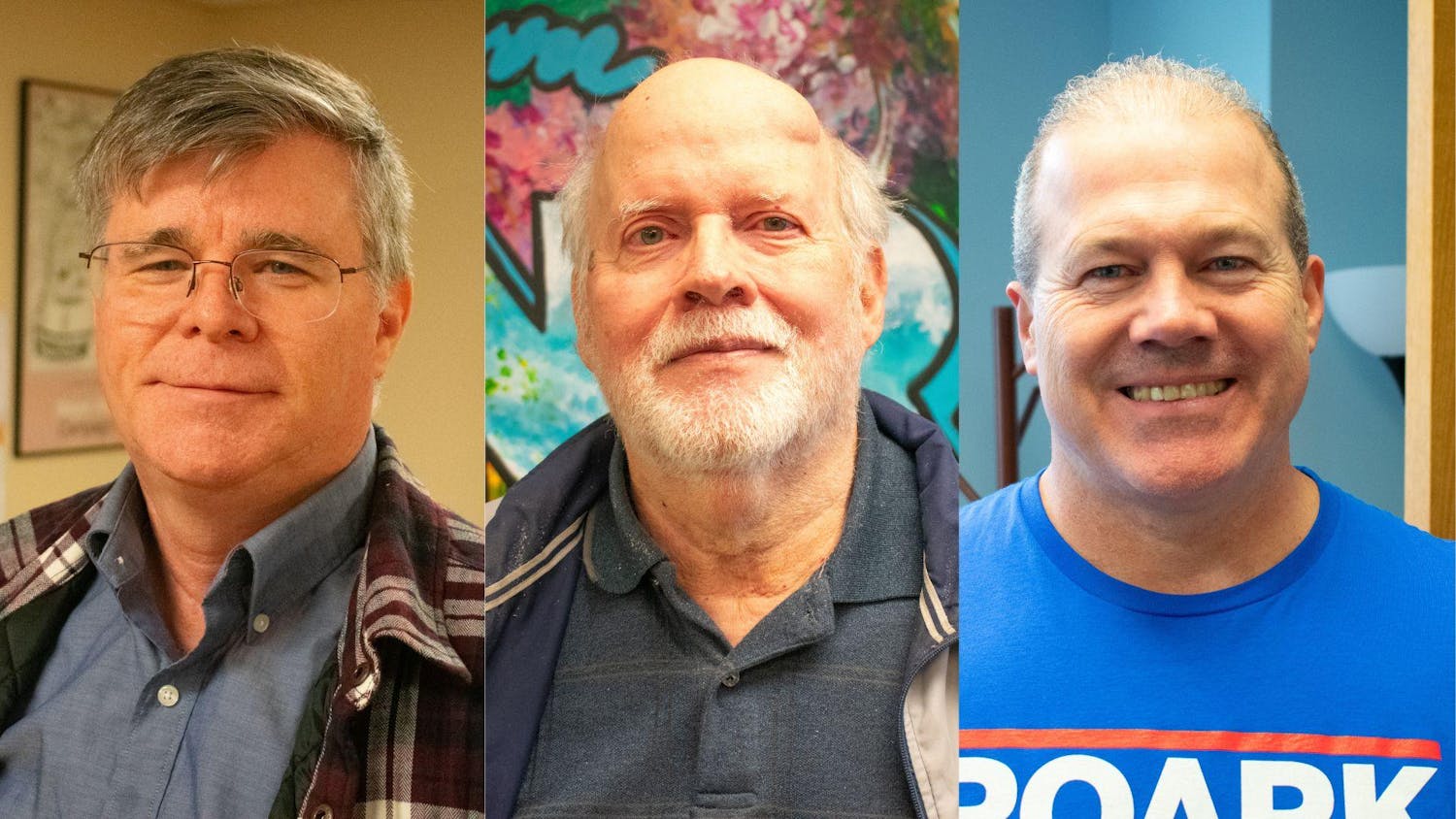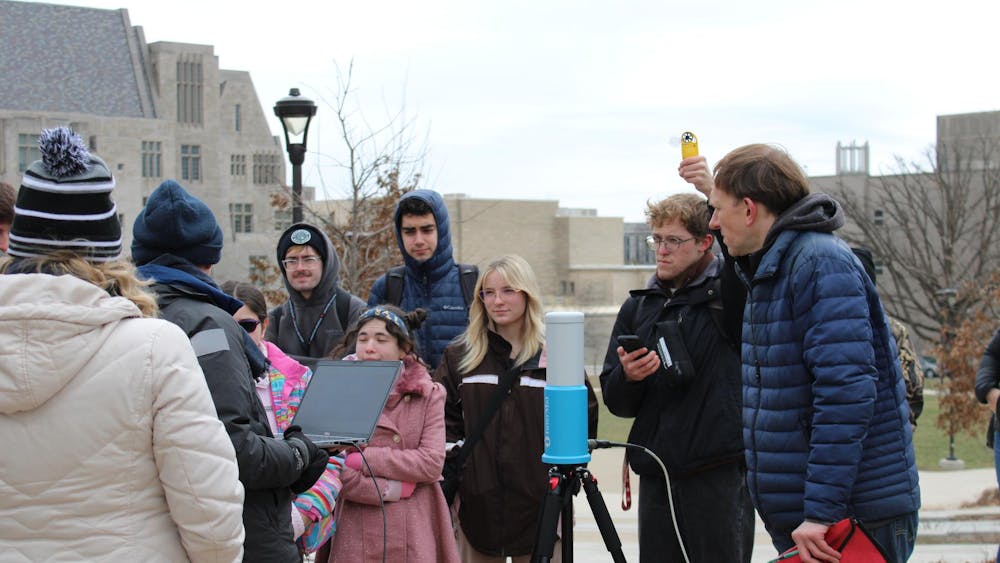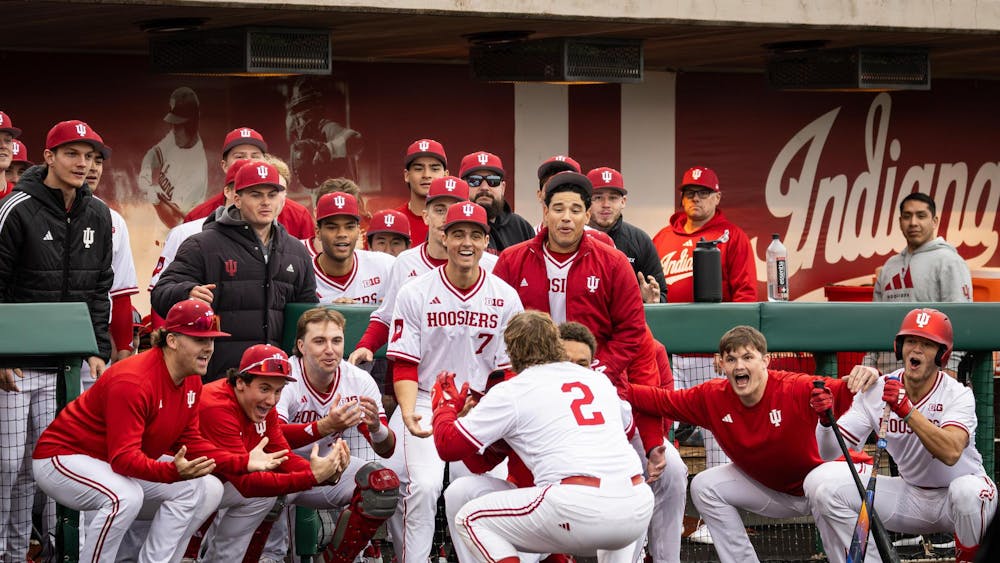Dressed in a crisp white button-up, khakis, heavy black boots and a paperboy cap, Thomas Buhls scrawls messages in chalk in front of the Herman B Wells Library.
“TRADYOUTH.ORG FOR FAITH AND NATION” and “PATRIARCHY IS BACK” are among the slogans peppered down the sidewalk.
A student stops in his tracks and watches Buhls’ work. A woman stops her bicycle to read one of the messages. They both move on without a word.
Buhls is the president and founder of IU’s Traditionalist Youth Network chapter, a racist, fundamentalist and anti-gay group. Trad Youth became an official student organization at IU in June. Although Buhls, a 30-year-old senior at IU, would not comment on their membership, the group has close to 2,000 Facebook “likes.”
In recent years, there has been a marked increase in the number of hate groups in the United States.
The Southern Poverty Law Center, a non-profit civil rights organization, reported 1,007 known organizations in the U.S., an almost 30-percent increase in the last decade.
But white supremacy and the Ku Klux Klan have deep roots in Indiana and at IU, with larger membership than the state’s largest Christian denomination in the 1920s. A decade later, faculty members and state legislators debated whether to display murals depicting Klansmen in Woodburn Hall, painted by Thomas Hart Benton to represent the previous decade’s political reality.
The murals with the KKK still remain today, and a former Klan member continues to spread a similar message.
“My ultimate goal would be to see another white ethno-state emerge — a state comprised of and built for exclusively white people,” Buhls said.
* * *
In Buhls’ ideal nation, members of other races would be welcome, but would be required to possess a passport to enter.
Buhls said he would like to think his work with Trad Youth is equally approachable for anybody. He concentrates on spreading the ideology of the traditionalist school of thought, which promotes a lifestyle based on values of Christian fundamentalism and orthodoxy.
“Probably the most controversial position which the Traditionalist Youth Network advances is the idea that we all have a tribe and we all have an identity and we all have a tradition,” Buhls said. “We encourage people to pick one and stick with it.”
Buhls upholds traditional views, but he said his childhood was anything but normal.
His father was in the Marine Corps until 1992, and Buhls spent his early childhood moving homes and schools for his father’s job.
They moved from North Carolina to Marine Barracks in London, England, and landed in Bloomington after his father retired.
In June 2001, eight years after relocating to Indiana, Buhls joined the Marines. During his time serving in the military, Buhls joined the Knights Party of the Ku Klux Klan.
At the time, immigration was a hot topic, and he said he was frustrated by the lack of government action against illegal immigration.
Buhls said his involvement with the Klan was “dedicated and passionate.” But over time, Buhls drifted away from the party’s position and methodology.
“For someone like me who’s more interested in actual grassroots political activism, and getting out in the street and doing something, I found that the Knights Party was not structured in a way to do things in a very immediate fashion,” Buhls said.
Through social media outlets, Buhls connected with other advocates for white identity in the country. Looking for an outlet to express his views and lead the charge on white nationalism, Buhls turned to Trad Youth.
Matthew Heimbach is the co-founder of the national Traditionalist Youth Network organization. A friend of Buhls, Heimbach also formed a White Student Union on the Towson University campus in Maryland. A documentary on Vice.com showed Heimbach and other members of the WSU conducting crime patrols on their campus, specifically targeting “black predators.”
In late August, a Towson University professor reached out to the IDS, expressing concerns at the Trad Youth Network’s planned protest at Boxcar Books in Bloomington.
Trad Youth is the “national extension” of Heimbach’s White Student Union, Buhls said. The group supports a variety of fringe ideas that have been inflammatory for students on campus.
“Ideally, we wouldn’t have to worry about multicultural issues,” Buhls said. “We wouldn’t have those problems because we wouldn’t have a multicultural society.”
* * *
On July 4, 1999, Benjamin Nathaniel Smith, a member of a white supremacist organization and a former student at IU, murdered IU Korean doctoral student Won-Joon Yoon.
After a three-day shooting spree across Illinois and Indiana, Smith drove by the Korean United Methodist Church, shooting the 26-year old. He shot himself later that day.
Doug Bauder, co-chair for the IU Commission on Multicultural Understanding, remembers the fatal shooting on Independence Day almost 15 years ago.
“When things like this come up, those of us who have been around are reminded how hate groups can lead to violent crime,” Bauder said. “It cast an absolute pall over the city.”
An increase in hate groups is linked to President Barack Obama’s liberal policies, especially regarding gun control and immigration reform, Mark Potok, senior fellow at the Southern Poverty Law Center, said in a report titled “The Year in Hate and Extremism.”
Obama’s election in 2008 reflects a change in demographics. U.S. Census reports indicate that 2012 was the first year white births were in the minority. By 2043, the white majority will likely be gone.
Potok’s report suggests the demographic shift is contributing to the expansion of hate groups.
Despite not being in the historically conservative South, Indiana has deep ties to white supremacy organizations. In the 1920s, membership in the KKK exploded. The IU-affiliated Indiana Magazine of History reported Indiana’s Klan was “the largest, most enthusiastic and most politically powerful Klan in the country.”
At its peak in 1925, Indiana’s Klan boasted more members than the Methodist Church, the state’s leading denomination.
* * *
On Aug. 6, Buhls received an email from the Office of Student Ethics. He was charged with “damage to or destruction of university property or the property belonging to others,” a violation of the Code of Student Rights, Responsibilities and Conduct.
Buhls had chalked and posted fliers in campus spaces where chalking and posting was not allowed, including a bus shelter, in front of the Indiana Memorial Union and inside academic buildings. The office required him to attend a conduct hearing.
“I got a little carried away,” he said.
The First Amendment prohibits the University from obstructing students’ rights to free speech, so aside from regulating Buhls’ materials in prohibited areas, no action can be taken by the University to prevent Trad Youth from spreading their message.
In order to uphold students’ freedom of speech, James Wimbush, vice president for Diversity, Equity, and Multicultural Affairs, said Trad Youth is a registered organization within IU. However, the University does not endorse the actions of the group.
“We find their message to be absolutely inconsistent with the values of the University,” Wimbush said. “It’s a message we absolutely abhor.”
Carol McCord, dean of students at IU, said many students have reported instances of Trad Youth’s chalkings and protests to the University’s Incident Teams.
“I know a lot of people have been made very uncomfortable by the messages of Trad Youth,” McCord said. “Some are even fearful.”
Although Trad Youth’s speech may be despicable to some community members, controlling hate speech has been unsuccessful on state and federal levels, Tim Lemper, IU law professor and one of Buhls’ instructors, said.
Attempts tend to regulate speech based on content, “and that’s offensive to the idea of protecting freedom of speech,” he said.
Efforts to put a lid on hate speech may actually be misguided, Lemper said. Every type of speech has value in the community by provoking dialogue and discussion, he said.
“The answer to bad speech is not to suppress it or to eliminate it,” he said. “The answer to bad speech is good speech.”
Despite run-ins with the law, numerous assaults on his person and the conduct hearing with the Office of Student Ethics, Buhls intends to push the limits of legality and University policy. The dance between his activism and University policy is a game, he said. It is important to Trad Youth’s form of activism to capture and keep attention on campus.
“I just sort of do what I do and hope I get away with it,” Buhls said.
Follow reporter Mary Katherine Wildeman on Twitter @marykwild.
Student activist promotes 'traditionalism'
Get stories like this in your inbox
Subscribe





